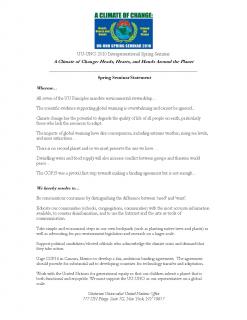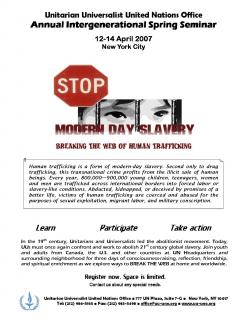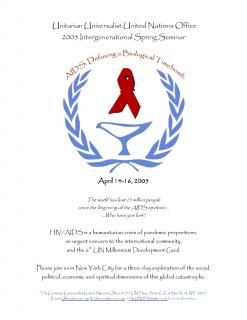Spring Seminar in Retrograde: Top Five Countdown!
By Dylan Debelis
Since 1957 the Unitarian Universalist United Nations Office has hosted an annual Spring Seminar. In 1998 the event evolved into an intentionally intergenerational space that brought together youth, young adults, and adults in shared dialogue around issues that matter to our Unitarian Universalist tradition.
Each Seminar calls participants to ask difficult questions about the reality of the world that we live in and the hope of the future world that we would like to create. Many participants say that the panels, creative programming, worship and community building that make up the Seminar are transformative moments in their lives that allow them to reaffirm how their faith can be lived and embodied.
Us here at the UU-UNO are similarly transformed each year. We begin to work on the next Seminar the second the previous Seminar wraps up in order to provide the most amount of time and planning to insure quality. Through this year long process of preparing the Seminar and implementing it, both interns and staff alike are able to learn, reflect, and grow. However, this forward-looking lens and brisk pace sometimes leaves little time for reflecting on our past accomplishments.
As we look forward to our upcoming Spring Seminar Sacred Roots: Indigenous Rights, Resistance, and Reclamation (happening April 3rd to April 5th) we wanted to publish this blog to reflecting at what we here in the Office think of as the top 5 Spring Seminars held within the past twenty years. Remember, this is a completely subjective list. If your list would differ from ours, that's great! Send us an email and let us know! If we get enough input we may publish a follow-up blog with thoughts from our readers!
5. A Climate of Change: Heads, Hearts and Hands Around the Planet (2010)
It is hard to remember a time before Climate Change was at the front and center of international conversation. However, even back in 2010 there were many around the world who claimed that Climate Change was a fallacy. A Climate of Change was the UU-UNO’s message to the world that Unitarian Universalists around the world were taking a stand against Climate Change and Climate Change deniers.
Following the Seminar many participants went on to create Climate Change awareness groups in their congregations and make waves in local politics. The majority of these groups and political movements are still around today. This is a testament to the seminar having a lasting impact on the UU movement and the world.
4. Beyond Borders: Breaking Barriers of Race and Immigration (2012)
Race and Immigration are no new issues to Unitarian Universalists. Our current UUA President Peter Morales has made it clear that advocacy, reform, and reflection regarding these topics is at the heart of his platform. Further, our congregations for many years have struggled with how to talk about diversity, race, and ethnicity in a way that is open and affirming.
Beyond Borders holds a special place in my heart not only because it was my first seminar but also because it was the first time I had ever seen Unitarian Universalists critically examine the racism present in our own tradition and how we can examine our own privilege in order to create justice locally, nationally, and internationally. The Seminar created a space to affirm that we each have the agency in going beyond our own borders to make a just world.
3. Modern Day Slavery: Breaking the Web of Human Trafficking (2007)
Modern Day Slavery was a watershed moment for the UU-UNO for two important reasons. Firstly, though youth had been involved since 1998, this was the first Seminar to focus programming around youth-based issues, including youth-trafficking and underage prostitution. Secondly, this event began a trend towards even greater interdisciplinary conversation bringing together not just academics or economists or UN politicians but also those who were directly affected by the theme.
Through this event the Seminar began to be less about reporting back to UU’s about the state of the world and more about hearing people’s stories and how UU’s can see themselves in those stories. Intentionally, the Seminar took the “how can I bring these stories back into my community?” question that had always been implicit in the Seminar and make it explicit. This marked an important shift in philosophy that is carried with the Seminar to this day.
2. HIV/AIDS: Defusing A Global Timebomb (2005)
In 2005 HIV/AIDS continued to wreck communities worldwide. New York City in particular was still reeling from the impact of the AIDS crisis of the 1990’s. Though there had been much work being done at the local and national level the UU-UNO noticed that there existed little aid for those struggling internationally. Many around the globe were killed, ostracized, or otherwise dehumanized for their HIV positive status.
Defusing a Global Timebomb brought together experts in the field to engage with Unitarian Universalists to discuss the role of faith in communities struggling with the question of HIV/AIDS. This moment was the beginning of the UU-UNO’s role in bringing LGBTQ issues to the forefront of UN dialogue and a statement of belief that liberal religion can and should make a stand about HIV/AIDS and all humanitarian crises worldwide.
1. Sacred Roots: Indigenous Rights, Resistance, and Reclamation (2014)
It may appear strange to include a seminar that has not happened yet at our number one slot in the countdown. However, we at the UU-UNO are positive that the 2014 Intergenerational Spring Seminar will be the best Seminar yet. Between UUA President Peter Morales and CUC Director Vyda Ng sharing the Keynote Address and the exciting worship and creative programming we have planned it will surely be a historic event that you do not want to miss.
This year’s Seminar runs from Thursday, April 3 until Saturday, April 5 and will take place in the United Nations and the United Nations Church Center in New York City.
Get your ticket today! Be a part of history!





